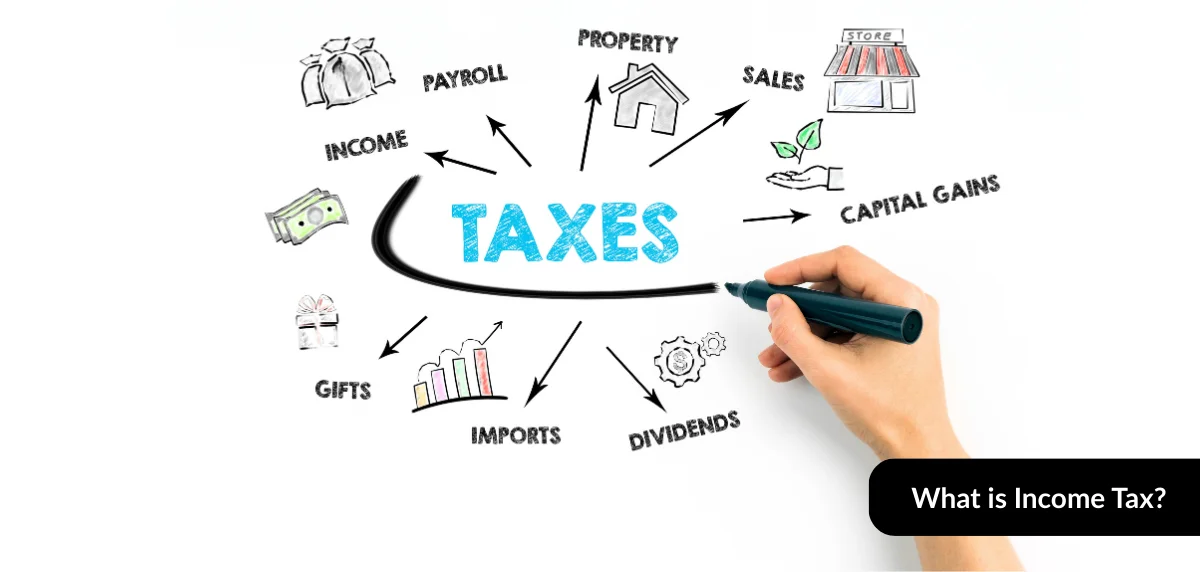Income tax is one of the most important contributions citizens make to the growth of the country. It is a direct tax charged on the annual earnings of individuals and businesses, and the money collected is used for development projects, infrastructure, healthcare, and welfare schemes. For many, filing taxes is a new experience that can feel confusing at first. But once you understand the basics of income taxation and how it works, the process becomes much simpler.
What is Income Tax?
It is a type of direct tax levied by the Government of India on the income of individuals, Hindu Undivided Families (HUFs), firms, and companies. It is regulated by the Income Tax Act, 1961, which defines the rules for income tax calculation, collection, and assessment.
When people ask what income tax is, the simplest answer is - it is the tax you pay on your income during a financial year (April 1 – March 31) as per the income tax slab you fall under. The year in which you earn income is called the previous year, and the year in which you file your return is the assessment year.
Another thing many people wonder is what income is in taxation. They should note that income does not refer only to salary, but also to earnings from house property, capital gains, business, and other sources.
The system also allows for deductions and exemptions, which help reduce your taxable income. For example, investments in life insurance plans, Public Provident Fund (PPF), and National Pension Scheme (NPS) are eligible under Section 80C.**
Who Is Required to Pay Income Tax?
Not everyone has to pay income tax, since the applicability depends on how much you earn. Any individual whose income exceeds the basic exemption limit (currently ₹2.5 lakh under the old regime and ₹3 lakh under the new regime as of FY2024-25) is required to pay income tax.
The common categories of taxpayers include:
- Individuals – Salaried employees, freelancers, professionals.
- Senior Citizens – Aged between 60–80 years (higher exemption limit under the old regime).
- Super Senior Citizens – Aged 80 and above (an even higher exemption limit under the old regime).
- HUFs (Hindu Undivided Families).
- Firms and Companies.
- Association of Persons (AOPs) and Artificial Juridical Persons.
Income tax is also linked to residential status:
- Residents (ROR) – taxed on global income.
- RNOR (Resident but not Ordinarily Resident) – taxed only on Indian income and business controlled from India.
- Non-Residents (NR) – taxed only on income accrued or received in India.
Understanding Important Terms Related to Income Tax
To deepen your understanding of what income tax is, here is a look at some important terms related to it:
Income Tax Slab
Income in India is taxed progressively. The income tax slab system sees to it that higher income is charged at a higher rate. For instance, income above ₹10 lakh may fall under the 30% bracket under the old regime, while the new regime offers different slab structures.
TDS
Tax Deducted at Source or TDS refers to the tax that is deducted by the payer before making a payment. For example, employers deduct tax from salaries, and banks deduct TDS on interest from fixed deposits. This ensures taxes are collected in advance.
Income Tax Return (ITR)
Individuals new to income tax often wonder what an income tax return is. It is a form you must file every year to declare your income and tax liability. Filing returns on time is mandatory and helps you claim refunds if excess tax has been paid.
Advance Tax
Advance Tax is also known as ‘pay-as-you-earn tax’, this is the income tax paid in instalments during the financial year, instead of waiting to do it at the end of the year.
Self-Assessment Tax
If you still owe tax after adjusting for Tax Deducted at Source and advance tax, you must pay the balance as self-assessment tax before filing your return.
Assessment Year (AY) and Previous Year (PY)
The Previous Year is when income is earned, while the Assessment Year is when it is assessed and taxed.
Form 16
Form 16 is a certificate issued by your employer showing salary earned, TDS deducted, and other details. It is essential for filing your return.
Saving on Income Tax via Deductions and Exemptions**
You are expected to pay income tax as per the tax slab you fall under. However, there are certain legal provisions that allow you to reduce your income tax liability. They can be in the form of deductions and exemptions available under the Income Tax Act.
Here are some popular options to consider:
Section 80C
Permits deductions of up to ₹1.5 lakh annually against investments in life insurance premiums, PPF, ELSS funds, 5-year tax-saving fixed deposits, and ULIPs.
Section 80D
Allows deductions on health insurance premiums for self, family, and parents.
House Rent Allowance (HRA)
Salaried employees can claim an exemption on HRA received if they live in rented accommodation.
National Pension Scheme (NPS)
Deductions are available under Section 80CCD(1B) up to ₹50,000 against investments in NPS, in addition to 80C deductions.
Other Options
In addition to the above, you can also reduce your tax outgo via the following:
- Deductions against education loan interest (Section 80E).
- Deductions against donations (Section 80G).
- Standard deduction for salaried taxpayers.
By combining these, individuals can plan better and reduce their taxable income. For assistance, using an income tax calculator can simplify the process.
How to File Your Income Tax Returns?
The process of filing your tax returns electronically, also known as income tax e-filing, has become very simple:
Step 1. Visit the official Income Tax e-filing portal.
Step 2. Register or log in using your PAN, which acts as your user ID.
Step 3. Select the right ITR form on the basis of your income type.
Step 4. Fill in details such as salary, house rent allowance, and capital gains.
Step 5. Claim deductions and exemptions under relevant sections like 80C and 80D.
Step 6. Submit and verify the return electronically (via Aadhaar OTP, net banking, or EVC).
Income tax e-filing saves time, reduces paperwork, and ensures quick processing of refunds.
Income tax is not just a legal obligation but also a contribution toward building the nation. Understanding what income tax is and being clear about concepts like income tax slabs and advance tax can make compliance easier. By making use of deductions and exemptions wisely, taxpayers can reduce their burden and plan effectively. The more you learn about income taxation, the easier it becomes to handle your finances responsibly.
** Tax exemptions are as per applicable tax laws from time to time.
























